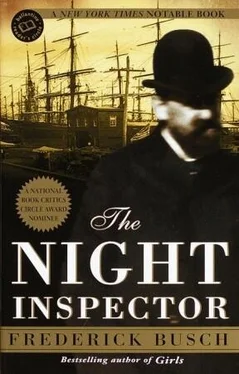I had not listened with acute attention, for I was thinking of business — mine, and therefore his — while he had been explaining something about white paper. I could not help but wonder if, since blank, white pages were so fearful, one might not use another color of page and thereby cheat one’s fears.
“And your comrade-in-arms, shipmate. Did he write his stay against the erasure by time?”
“I have not seen any notice of such a book.”
“It seems a very good time to be issuing memoirs. If you have lived even but a little, but have knowledge of suffering of sorts, the same presses so hospitable to the ladies’ books of household drama, thirty and forty years ago, now seem receptive to recollections of the utmost mundanity.”
“Even, I understand, to works by Negro authors about their servitude,” I said, for it was time to come to grips with our subject.
“Poor devils.”
“From such works,” I extemporized, “it has been learned — do you believe it? — that men of commerce continue to use slave labor? That slaves, indeed, are still kept? That the imprisonment of the darker brother, in certain Southern places, goes on?”
“Imprisonment is a condition, I fear, of humanity.”
“But I am speaking, sir, not in the abstract, but of flesh-and-blood humanity.”
“Yes,” he said. He grew still, and I sensed that I would have to return to the topic on another day. I could wait. He said, “Forgive me. I am thinking of my children. Mal is out every night, and I worry. Stanny is silent and somehow removed. The girls argue with me as to how I wear my clothing and how many hours, of a weekend, I till the fields of language in my room.” He shook his head, then drank the last of his coffee. “And I have lost the track, my friend. Forgive me. I cannot remember what we discussed.”
“What could be more important than a man’s repose among his children?”
“I surely did not speak of repose. That we do not entertain. What is repose?”
“Not, apparently, a family,” I said. He laughed his imitation of laughter. We spoke of the ship he would inspect that morning, which had lain- to over the night, a Dutchman bearing molasses and rum.
“I’m off,” he said suddenly, pushing back from the table and moving, as he often did, with the grace of someone younger. “I’m a man of action today. It’s tonnage and seals. My customary chores.” He clipped his little badge onto his lapel, patted my back, and walked off. I waved him good-bye and set my mask on under the veil before I removed it. I would broach the topic again, and at a suitable moment. I knew how to wait.
And in the end, by the by, I did permit them to unwind and to rewind the bandages, restoring to my sight the boy author of war, Samuel Mordecai, and the world he thought to write.


I NOTED, AS THOUGH OBSERVING SOMEONE ELSE — as though I were Sam Mordecai, or the man who once was M — that I brought shirts and handkerchiefs for cleaning although it was not the usual day. The boy, perhaps eight, was sulking as he struggled up the three stoop steps with his barrel of stained water. As I understood it, they made much of their boys and little of their girls, yet here was her son at the same labors — arms around the keg as if embracing it, yet with a face that said nothing of embrace — as were performed by his sister, who, younger than he, seemed stronger of arm and leg. He was chubby, while the girl was lean, like her mother, who bowed as she received the shirts and the red handkerchiefs I affected in those days (perhaps to demonstrate that once I had been a soldier in the field).
She looked at the rim of the collar. She brought the shirt to her face and sniffed, and I became embarrassed. The children stared at my mask. “Not so dirty,” Chun Ho said.
“Really? Shall I take them back?”
“No back. I keep. Clean ’em.”
“What are your children named, then?”
“Boy Kwang. Daughter Ng.”
“How do you do?” I called. They stayed back by the stove and studied the apparition that had been greeted by their mother. Something meaty and sweet was slowly cooking on the stove beside the great black kettle in which she heated water.
“No bath today,” she said in a soft voice, as if it were an intimacy impossible to perform before children. Perhaps it was, I thought, regarding her stiff face, her lively eyes, the sweat stains at her arms, and the way her baggy clothes fell back against her flesh. I associated the cooking meat with appetite, the appetite with her, and I stepped away, then stopped.
“Boys work as girls do?”
“No. Always not.”
“But your boy — but Kwang does.” He looked up when I said his name.
“Now, Merica,” she said. “Ogin. Fonia. New City. New York City. Merica States.”
“The United States.”
“Sure. United States . Wife of dead man, boy, girl: United States . Everybody work. You think?”
I said, in an eager way I am unaccustomed to hearing from my lips, “I would help you, you know. If you needed me to, I would help you.”
She looked at me shrewdly; I felt weighed, evaluated as the steam and the scents of herbs and pork, perhaps, and of something corrosive — maybe a bleaching agent — rose at the low ceiling of the small, hot room. I thought of how she lifted my limbs to scrub them, of how she held each hand in turn to clean the knuckles, the palms.
I said to him, although I faced his mother, “Be good, Kwang. Be a small man.”
“All men not so good,” she finally said. “Some good.”
We studied one another, I suppose you would have to call it.
“Shirts one day, two day. Yes?”
I shrugged.
Then she shrugged, as if in reply, and suddenly she smiled with a kind of abandon before she recomposed her face.
I thought, as I walked one step backward, then turned to leave, that I must remember what she had fleetingly looked like when she forgot to hide: wife of dead man .
At the office, I lit lamps, for the day was sullen and dark and very little light spilled down along the brick wall opposite my window, inches away. Mail came from the main post office on nearby Nassau Street, and I very much appreciated that, for the office had first been the Middle Dutch Church, which for me had the appearance of a bank in a nightmare. I had a notice of freight transfer from one of the wooden sidewheel steamers of the Collins Line, out of Liverpool, to the New York Central — bales of cloth for upstate merchant brokers. I had two letters concerning payment; one enclosed it in the form of a check drawn upon the Bank of New York, and the other begged for time in remunerating me for having purchased and sent by barge across the river to New Jersey a shipment of teak, brought over from the north of Siam through a brokerage in France, for the building of small boats. I wrote an angry note refusing to extend the debt; I would deliver it later to a small man in a large, empty office — he had a desk and two chairs in a room on Maiden Lane the size of a small restaurant — and he would write it gracefully and sign on my behalf and see it sent.
Having thought so recently of Sam Mordecai, I would not have been surprised to receive a letter from him, but nothing had arrived. I was not dismayed when events of which I had dreamed came to pass, nor had I changed in this wise since my boyhood. Once, when my uncle, staying (it felt like a decade) for several days, had lost his pocket notebook, and had become very much vexed and even more difficult than he usually was, I had dreamed of finding it behind the firewood I’d split and stacked, and which he had inspected like a grand vizier of the upstate forests. That is, I had seen the little leather book, had in my dreaming felt the textured surface of its cover, had shoved aside the fresh peach-colored surface of the quartered birch logs to seize it and hold it in the air before his quivering wattles and cloudy eyes. I had wakened and, still in my nightshirt, had walked barefoot into the autumn morning to move the wood about and hold it up. There had been no shaking it in the air before his face, however, because he was Uncle, after all, and he had kept us from falling further into debt and discomfort once my father was dead. But I would not have been surprised to see an envelope from Samuel Mordecai.
Читать дальше














